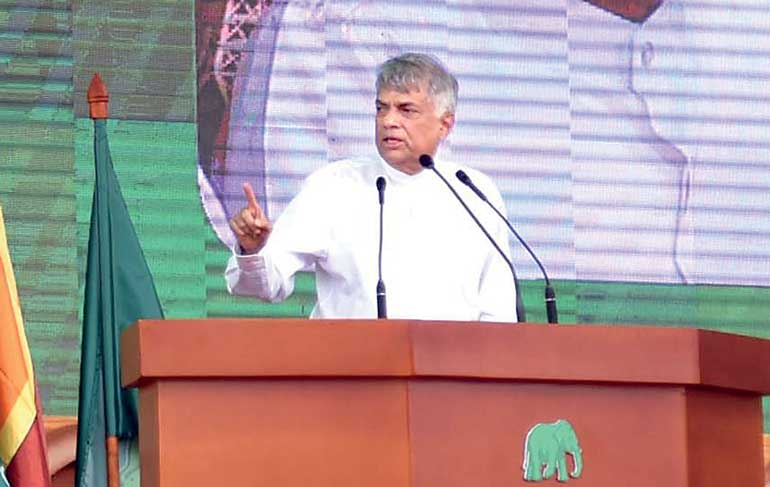

Three Cheers to the Government and may its dream come true! The Prime Minister on the occasion of celebrating the 70th anniversary of the UNP stated that by year 2020, the national debt will be reduced; and vouched that this challenging burden will not be left to be solved by the next generation.
The citizens should clap, if this objective can be achieved. However, the citizens must stand vigilant and hold the Government to account to ensure that this target is realised for the sustainable growth and prosperity of this nation and its people.
The Economic Policy Statement made by the Prime Minister in the Parliament on 5 November 2015 committed that the final goal of the new regime was to improve and enhance the living standards of the people, and he further stated that;
-
in 2000, the exports stood at 30% of the Gross Domestic Product and by 2014, it had gone down to 15%, and
-
in 2003, 19% of the GDP was raised as State revenue, but by 2014 this had gone down to 10%, and
-
today, we are in debt to the whole world.
and envisioned that through the leadership of the new government Gis commitment;
-
to reduce the budget deficit to 3.5% of the GDP by 2020.
-
to increase the ratio of direct and indirect income tax generation in the medium term from 80%: 20% to 60%: 40%
-
to encourage investments that generate employment
-
to create a special financial and a business hub in Colombo
-
to provide knowledge competencies needed
-
a lawful economic environment that will set the stage for sustainable development
Regrettably this policy announcement had one glaring absence; i.e. a specific strategy to meet the looming debt crisis. Now nearly one year later, we hear the Prime Minister commit to reduce the national debt by 2020, but regrettably again, there is silence on how it is to be achieved!
In what ways can the national debt be reduced in the next four years? And can it be achieved?
-
By stimulating expanded growth in the economy, leading to higher levels of State revenue via taxes, levies, and state enterprise profits?, and
-
By adopting effective fiscal discipline, efficient public finance management and prudent, sustainable use of State and national resources?, and
-
By eliminating the presently experienced twin deficits?
-
If these twin deficits are reversed and results in the annual fiscal deficits and the current account deficits being eliminated, certainly the national debt can be reduced, ;
-
However, these objectives are unlikely achieved as the government itself believes it will have a budget deficit of 3.5% at least by 2020; and
-
The current policies support growth options stimulated via unabated imports of consumption and construction goods, along with low productive capital goods and transport vehicles.
-
In addition there are no positive signs that export incomes will substantially increase in the short term nor will income from export of services spring up vertically.
If so, will the Government look to other options to reduce the national debt?
-
By significant privatisation proceeds being realised, which is also unlikely in the current policy framework;
-
By attracting significant new Foreign Direct investments to our shores; here again the current political and policy uncertainty, coalition politics and public resistance will pose significant challenges; further delays in the implementation of second generation reforms will be a major stumbling block; thus this option remains doubtful to succeed, especially when there are more safer, stable, competitive and productive economies for investors to place and hedge their investment bets
-
By a significant share of the current informal economy being captured within formal revenue contributing sectors and the level of illegal fund transfers and money laundering being eliminated. That will be a distant dream within the present societal value system, socio-political-economic risks and patronage politics!
-
By all economic activities of both the State and private sectors, being focused on exploiting value enhancing niche market opportunities, leveraging strategies which are enabled by creativity, innovativeness and the use of best options of science and technology, in order to enhance productivity, intensity and quality of resources and outputs; and this core value becomes embedded as a societal value and results in significant increases in the levels of national savings and investments: this is most unlikely as this nation lacks leaders with power, integrity, vision and commitment to deliver real and sustainable value to this nation
-
By debt swaps arranged converting debt to equity; the reported lack of appetite from the Chinese authorities is anything to go by this also looks a nonstarter
-
By attracting bilateral and multilateral aid, grants, transfers and debt forgiveness: these are not options due to our economic classification
In the meantime there does not appear to be any signs that collective and professional budgetary implementation efforts will soon be in place to
-
Optimise by 2020 for State revenues to be at least 20% of GDP, with the targeted increases mainly recovered based on those with ability to contribute, contributing their share proportionate to their wealth, profits and cash flow returns
-
have prudent, equitable and sustainable decision making in scare resource allocations placing due emphasis on inclusiveness and welfare, and needs and aspirations of those at the bottom of the pyramid
-
have fiscal discipline to ensure that public finances are allocated based on well-defined transparent national priorities and assuring sustainable positive national economic returns commensurate with such allocation objectives
-
ensure that the fiscal gap (being the value today (the present value) of the difference between projected spending (including servicing official debt) and projected revenue in all future years) keep improving
In the absence the above positive signals in the economy, lack of demonstrated capability in professional treasury and economic management, backed by the cabinet singing from the same hymn sheet, there is much doubt that the national debt can substantially be reduced by 2020.
The pessimism that the promise of delivery of the commitment is further enhanced by
-
failed to effectively implemented last two budgets, where even the basic tax reform proposals had been folded up and remain unimplemented
-
the majority of the visionary commitments in the National Economic Policy pronouncements of the Prime Minister in November 2015 remain yet as words of wisdom not effectively implemented
-
the Election Policy Manifesto of the United National Front for Good Governance unveiled in 2014 titled ‘the Five Points programme’ to create a new country in 60 months are yet to be embedded as firmly implemented actions where successful results can be assured, especially in regard to the core commitments regards
-
Growing the Economy
-
Fighting Corruption
-
Ensuring Freedom For All
-
Investing in Infrastructure
-
Improving the Education System
The above analysis is further evidenced by the Ceylon Chamber of Commerce Economic Intelligence Unit Survey findings where “business leaders are optimistic about the government’s ability to deliver economic results in the next four years, but are critical of the progress made so far and have mixed views about Budget 2017”.
These findings are further elaborated by comments “showed a lot of pessimism to a question ‘How focused is the Government on creating policies that support private sector growth’?”; “expressed strong disappointment in the progress of reform in the first year of the government’s term”; and “were a bit more optimistic about the future” – but emphasised that “uncertainty prevailed”.
The recent announcement by the President that 2017 be declared as a year ‘the country will be liberated from poverty’ is also highly recognised by civil society.
It is the fervent wish of the civil society that the forthcoming National Economic Policy Statement of the Prime Minister will elaborate on the strategic action planned by the Government in support
-
of realising the vision to reduce the National Debt by 2020 and make significant advances in meeting the challenges of the fiscal gap
-
of meeting the likely medium term balance of payments challenges
-
of liberating the country from poverty and delivering the socio economic rights of citizens
-
of realising the set objectives of
-
increasing State revenue to GDP
-
assuring equity and inclusiveness in national resource allocations
-
liberating marginalised families impacted hitherto by war, conflict and natural disasters
-
ensuring good governance in a corruption and narcotic substances free society
-
sustainable development in line with the Paris Declaration
-
A National Involuntary Resettlement/Reparations Policy applicable across the country
-
Developing the capability (knowledge, skills, attitudes and values) of the human resource pool to meet emerging job opportunities
-
Investing in infrastructure and urban and rural development with equity and inclusiveness
-
Attracting foreign direct investments and promoting public private participation led investments creating niche market new job opportunities
It is also the wish of civil society that the budget to follow the economic policy announcement will spell out the medium term action strategies and fiscal/monetary outcomes of the policy framework announced by the Prime Minister.